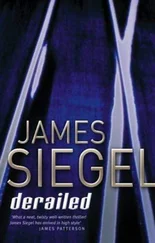Maybe Miles had hired Pablo. Maybe Miles’ Wednesday night call had simply slipped her mind.
And Moshe? Maybe what he’d whispered to the steroid user had been an innocent crack. Something about the spider—about actuaries with silly phobias.
And those men running after him? Why not, if he’d just clobbered one of their coworkers over the head.
Maybe.
Only he couldn’t forget the way Moshe looked at him through the office door—that smile dripping with chilling insincerity. The way Moshe watched him walk down the hall to the bathroom, as if sighting his prey.
And something else. Miles had gone to move his car but never came back.
Things were beginning to stir in the neighborhood.
People were trickling out of their houses—young, old, even ancient. Unlike Miles, these were people who didn’t dare offend God, even if he did scare off a client or two. The men wore long corkscrew sideburns falling down to their shoulders like Victorian ringlets. They all wore black skullcaps. They must be headed to worship, Paul guessed, suddenly realizing it was Saturday.
Eighteen hours and four days. Dread seized him and refused to let go.
Miles’ house remained conspicuously quiet.
Paul waited twenty minutes—eight o’clock, a reasonable hour to be awake and functioning.
He got out of the car and walked up to the brownstone steps.
He thought he saw a flash of movement through the living room window, slight and insubstantial, like the shadow of a butterfly.
When he knocked on the door, he only had to wait ten seconds before Rachel opened it.
She was dressed in her Saturday best, wig firmly in place under a black wide-brimmed hat, evidently ready to join the throng making its way to prayer. She peered at him quizzically, giving a phantom glance at her watchless wrist.
Yes, it was kind of early for visitors.
“Hello,“ Paul said as normally as he could muster. “Is Miles here?”
It was an obvious question, Rachel’s face seemed to say. Where else would Miles be at eight on a Saturday morning but in his home?
“He’s not feeling well. I was about to take the children to shul, Mr. Breidbart. Was he expecting you?”
Good question, Paul thought.
When Miles asked Rachel who’s there? from behind the door and groggily walked into view without waiting for a response, Paul decided the answer was no.
He wasn’t expecting him.
Miles looked surprised, even shocked. It wouldn’t be amiss to trot out an overused cliché and say he looked as if he’d seen a ghost. He didn’t look like he was feeling well, but the sight of Paul had evidently made him feel worse.
Miles recovered. Maybe his lawyerly instincts took over, reverting to the kind of expression he’d be expected to maintain if one of his clients had just confessed to murder on the stand. Of course Miles didn’t practice trial law—he’d gone into foreign adoptions. And a few other things you maybe didn’t need a license for.
“Paul,” he said, a quasi smile plastered to his face. “I said I’m always available, but this is ridiculous, no?”
Okay, Paul thought, give him credit for grace under fire.
Something was bothering Paul—besides the obvious.
Think.
Miles brought him to Little Odessa to have him killed. Paul had assaulted someone, hijacked a car, and escaped. Moshe would’ve called Miles with that piece of news.
So why was he so shocked at seeing Paul in the flesh and still standing?
“I ran into a little trouble,” Paul said.
Rachel was standing between them like a referee who doesn’t understand the bout’s begun. “You should go upstairs and rest,” she said to Miles with just enough wifely edge to make her point. Business was business, but this was his day off.
“Trouble?” Miles responded, ignoring his wife. “By the way, sorry I was called away yesterday. Did Moshe tell you?”
More to the point, Paul thought, did Moshe tell you ? And if not, why? For the fiftieth time that morning, Paul asked himself if it was possible he’d gotten it wrong. He would’ve given anything for that to be the case.
Rachel cleared her throat.
“It’s okay, honey,” Miles said. “I promise that after I talk to Paul here, I’ll take a nice long rest.”
Miles looked like he could use it. He appeared feverish and tired, as if he hadn’t slept in days.
That made two of them.
Rachel clearly wasn’t happy about Paul’s intrusion, but she silently acquiesced. She called her sons.
They slipped through the front door and trooped down the brownstone steps behind their mother with no great enthusiasm.
It was just the two of them now.
Miles said, “Come in.”
He led Paul into the familiar clutter of his office. “So what did Moshe say? Can he help you?”
Paul still desperately wanted to believe Miles.
He wanted to apologize for braining that man with a cement block and for stealing a car.
He wanted to cling to the image of a Miles who’d braved death with him in the Jersey City swamps.
He couldn’t shake Miles’ initial expression at the door. His surprise at Paul’s aliveness . Miles had known what awaited Paul in that warehouse. If Paul was wrong about everything else, he was right about that.
“What’s the matter?” Miles asked, still the friendly lawyer out to help. “You said you ran into trouble. What happened?”
“María called me,” Paul said, letting that simple statement hang there for a moment.
“María?” was all Miles said.
Paul noticed that the telephone Miles had used to call María Consuelo—or not call her—was lying off its hook. Then he remembered something.
Religious Jews weren’t allowed to take calls from sundown Friday to sundown Saturday.
Orthodox rules.
Miles thought Paul was dead and buried, because Moshe hadn’t been able to call and tell him otherwise.
“That night you picked up the phone and called María?” Paul said. “You didn’t call her. You just pretended to.”
Paul made sure to speak slowly so Miles would be able to grasp the full import of what he was saying—and because it was hard to actually get the words front and center. “If María hadn’t called and told me, I would’ve walked into that office with your friend. I’m pretty sure I wasn’t going to walk out.”
Everything seemed to drain out of Miles’ face. Paul remembered a Thanksgiving Day balloon he’d seen punctured on TV when he was a kid—the huge smiling visage of a cartoon sheriff running into a streetlamp and deflating into something wrinkled and insubstantial.
“You’re an insurance actuary,” Miles said, “right?”
“Yes.”
“Okay. What are the odds of you making it out of here alive?”
He was pointing a gun at Paul’s head.
It had suddenly materialized from behind the desk; he must’ve pulled it out of a drawer.
“Let me give you the facts,” Miles said. “It’s how you guys work, right? Facts—then figures. This is an Agram 2000. Croatian made, machine action. It used to belong to an honest-to-God KGB assassin—at least that’s what Moshe told me. They liked the Agram because it’s small enough to stick in your pocket and highly accurate up to twenty feet. More facts. We’re alone—my wife and sons are praying to a just and benevolent God. Also, that funny thing on the end of the barrel? A silencer. No one will hear me shoot you. Okay, now, what would you say the odds are?”
“Poor,” Paul said. And getting poorer by the second, he thought. Miles was having trouble keeping his hand steady—the one gripping the Agram 2000.
“Why?” Paul asked.
For a moment it appeared that Miles hadn’t heard him; he seemed to be listening to something else. He stood up, walked to the window, peeked out through the curtain—all the while managing to keep the gun trained on Paul.
Читать дальше












